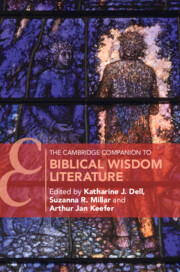Book contents
- The Cambridge Companion to Biblical Wisdom Literature
- Cambridge Companions to Religion
- The Cambridge Companion to Biblical Wisdom Literature
- Copyright page
- Contents
- Contributors
- Acknowledgement
- Abbreviations
- Part I The Context of Wisdom Literature
- Part II Wisdom Literature in the Hebrew Bible
- Part III Wisdom Literature beyond the Hebrew Bible
- Part IV Themes in the Wisdom Literature
- 20 Creation in the Wisdom Literature
- 21 Reward and Retribution
- 22 From Rebuke to Testimony to Proverb
- 23 The Wisdom Literature and Virtue Ethics
- Bibliography
- Index
- Cambridge Companions to Religion
- References
22 - From Rebuke to Testimony to Proverb
Wisdom’s Many Pedagogies
from Part IV - Themes in the Wisdom Literature
Published online by Cambridge University Press: 28 July 2022
- The Cambridge Companion to Biblical Wisdom Literature
- Cambridge Companions to Religion
- The Cambridge Companion to Biblical Wisdom Literature
- Copyright page
- Contents
- Contributors
- Acknowledgement
- Abbreviations
- Part I The Context of Wisdom Literature
- Part II Wisdom Literature in the Hebrew Bible
- Part III Wisdom Literature beyond the Hebrew Bible
- Part IV Themes in the Wisdom Literature
- 20 Creation in the Wisdom Literature
- 21 Reward and Retribution
- 22 From Rebuke to Testimony to Proverb
- 23 The Wisdom Literature and Virtue Ethics
- Bibliography
- Index
- Cambridge Companions to Religion
- References
Summary
William P. Brown explores the pedagogy of the wisdom literature. He argues that wisdom is dynamic as it is imparted between individuals, and that it finds its telos in human character development. This dynamic pedagogy is versatile. Sometimes (especially Proverbs 1–9), it manifests itself in rebuke, pronounced hierarchically in the matrix of patriarchal authority. Rebuke, though, can also be dialogic; in Proverbs, the wise also impart it amongst themselves. Both models of rebuke are evident in Job, where Job and his friends reciprocally rebuke each other, and God hierarchically rebukes Job. God’s rebuke, though, is not simply belittling, rather eliciting wonder through the pedagogy of the Master Poet. These texts also teach through testimony – Qohelet invokes his personal observations and investigations, and Wisdom herself testifies to her role in creation (Proverbs 8). Here, Wisdom comes alongside readers as a playing child, and welcomes them as a gracious host. Finally, proverbs have pedagogical power, revelling in comparison, paradox, irony, and metaphor.
Keywords
- Type
- Chapter
- Information
- The Cambridge Companion to Biblical Wisdom Literature , pp. 433 - 454Publisher: Cambridge University PressPrint publication year: 2022

